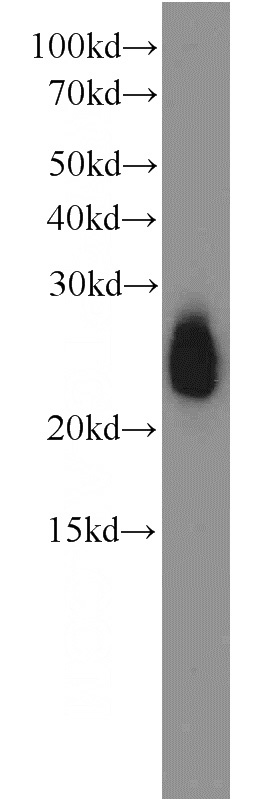-
Product Name
APOD antibody
- Documents
-
Description
APOD Rabbit Polyclonal antibody. Positive WB detected in human serum tissue, HepG2 cells. Positive IHC detected in human colon cancer tissue. Observed molecular weight by Western-blot: 22-33 kDa
-
Tested applications
ELISA, WB, IHC
-
Species reactivity
Human; other species not tested.
-
Alternative names
Apo D antibody; APOD antibody; apolipoprotein D antibody
-
Isotype
Rabbit IgG
-
Preparation
This antibody was obtained by immunization of APOD recombinant protein (Accession Number: NM_001647). Purification method: Antigen affinity purified.
-
Clonality
Polyclonal
-
Formulation
PBS with 0.1% sodium azide and 50% glycerol pH 7.3.
-
Storage instructions
Store at -20℃. DO NOT ALIQUOT
-
Applications
Recommended Dilution:
WB: 1:200-1:2000
IHC: 1:20-1:200
-
Validations

human serum tissue were subjected to SDS PAGE followed by western blot with Catalog No:108030(APOD antibody) at dilution of 1:1000

Immunohistochemical of paraffin-embedded human colon cancer using Catalog No:108030(APOD antibody) at dilution of 1:100 (under 25x lens)
-
Background
Apolipoprotein D (ApoD) is a member of the lipocalin superfamily of ligand transporters, and has been implicated in the transport of small hydrophobic molecules. ApoD is also a component of plasma high-density lipoproteins (HDL). Alteration of ApoD expression has been linked to multiple neurological disorders, including Alzheimer's disease.
-
References
- Wei YJ, Huang YX, Zhang XL. Apolipoprotein D as a novel marker in human end-stage heart failure: a preliminary study. Biomarkers : biochemical indicators of exposure, response, and susceptibility to chemicals. 13(5):535-48. 2008.
Related Products / Services
Please note: All products are "FOR RESEARCH USE ONLY AND ARE NOT INTENDED FOR DIAGNOSTIC OR THERAPEUTIC USE"
